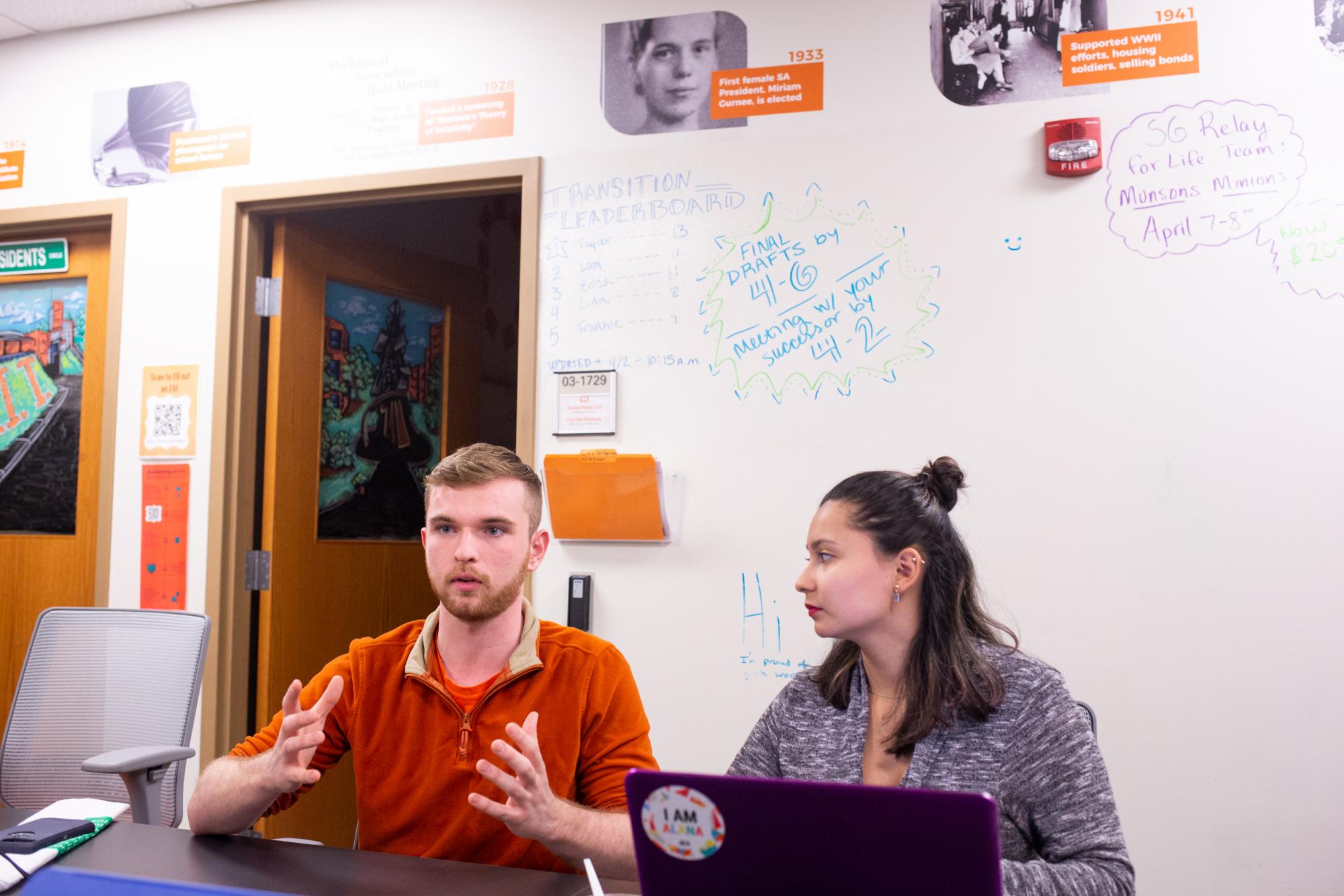Bobby Moakley, a third year Environmental Science and International and Global Studies double major, and Corinne Mendieta, a fourth year Mechanical Engineering Technology major, were elected Student Government’s (SG’s) President and Vice President for the 2018–2019 academic year.
Both have previous experience working in SG. Moakley currently serves as the Vice President and Mendieta as the CAST Senator. They look to use their personal experience within SG to improve the organization’s performance.
Student Advocacy
In order to accomplish this goal, Moakley and Mendieta stress the importance of working more closely with their RSO (Representative Student Organizations) delegates. These RSOs represent several demographics on campus. ALANA Collegiate Association (ACA) represents Asian, Latin, African and Native American (ALANA) students. Global Union constitutes all international students. OUTspoken serves the LGBTQ+ population. NTID Student Congress (NSC) represents deaf and hard-of-hearing students. Student Athlete Advocacy Council (SAAC) advocates on behalf of student athletes. These organizations have various affiliates across campus and work closely with their constituencies to bring issues to the forefront of SG’s agenda.
In previous years, RSOs have had voting seats on the SG Senate. However, they were largely unaffiliated with SG members. Going forward, Moakley and Mendieta want to change that in order to improve the relationship between RSO representatives and SG members. The two reason that it is much easier to work with those you are well-acquainted with. By inviting RSOs to SG training, retreats and other events, they will be more included in the grand scheme of SG.
“While we have great ideas, we recognize that the greatest ideas are probably going to come from the new leaders with fresh perspectives,” Moakley said. “So, we want to bring our ideas to life, but also train and develop all the ideas that others have coming in because that’s what’s going to make this organization strongest.”

Another major talking point in the new president and vice president’s plans is to dissolve the barriers between students and their creativity. In fact, their campaign slogan was “helping you achieve your creation.” This epitomizes their idea that students should be able to pursue their passions and be free to make new and exciting projects, both within and outside of the curriculum.
To do so, the two plan to speak with freshmen and educate them on the various resources available on campus, such as The Construct and The Simone Center. Both facilities help to turn students’ dreams into reality and spreading the word about these resources will allow students to take advantage of them and experiment with new, exciting projects.
Beyond this, Moakley and Mendieta will work to set aside SG funds specifically for student use. They hope to allow students to ask SG for funding for large projects, attending conferences and conducting research. They recognize that many students have financial barriers preventing them from achieving all they could, and they look to alleviate this block.
Governance Reform
Other key facets to their plan next year included bolstering marketing efforts, increasing transparency in SG and working more closely with faculty and staff at University Council.
“One of the biggest things we’ve been lacking in this year is communications and marketing,” said Moakley.
To solve this issue, they plan to release a regular newsletter, providing SG updates to the student body as a whole. Through this newsletter, students will be able to keep up-to-date with various petitions and projects underway in SG and be informed of any major issues SG is looking into.
“One of the biggest things that happened this year was the C11 Policy and, when that came around, we recognized that, while Student Government can do a lot, sometimes we’re really going to need input from the entire student body,” Moakley stated.
When faced with similar undertakings next year, Moakley and Mendieta wish to push for improved contact with students so they can stay informed and participate if they wish.
According to Mendieta, the two want to ensure the students know they're being heard and make sure that they know that they are making a difference.
"We're more than just a name," Mendieta said.
Finally, the two agreed that more cooperation was necessary between SG and the other governance groups on campus, Academic Senate (AS), Staff Council (SC) and University Council (UC).
Currently, issues brought into one of the governance groups is handled by that group largely in isolation of the other groups. Only after a resolution is reached is the project formally introduced to the other governance groups for their input and endorsement.
Under the new plan, Moakley and Mendieta hope to integrate faculty and staff into PawPrints, allowing them to create and sign petitions, as well. This will allow both AS and SC to easier gauge the wants and needs of their constituencies, as well as allow feedback from each of the three groups to be reflected in all petitions. Moakley and Mendieta also look to improve communications between the governance groups, encouraging the three organizations to work closer together to find solutions most beneficial to those most in need.
The Big Picture
Overall, Moakley and Mendieta realize their plans are ambitious. They want to pace themselves so as to not overwhelm either themselves or those they will be working alongside.
“We could start off with tiny things like group chats and trying to get to know each other,” said Mendieta.
By starting out on the same page and having a thorough understanding of each others’ goals and expectations, Moakley and Mendieta hope to make progress, and the two are looking forward to a productive year ahead.









